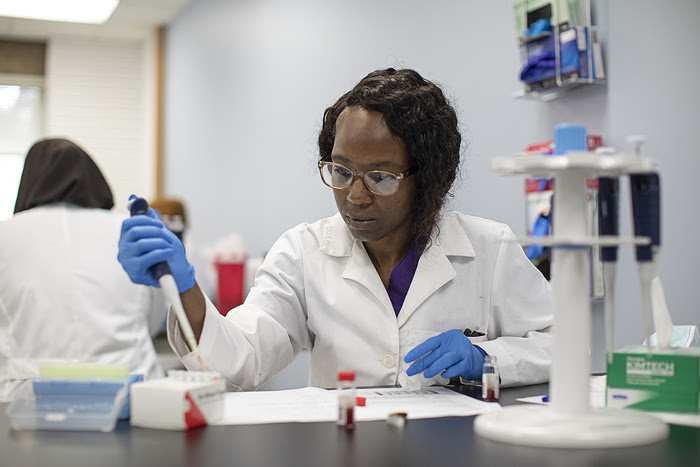
Helping Behind the Scenes: 5 Advantages to Being a Medical Lab Professional
Physicians and other clinicians rely heavily on lab testing to help care for patients. That means the medical lab professionals who conduct those tests are vitally important. As the volume of testing grows and new types of testing emerge, medical lab professionals will continue to be in great demand.
If you’d like to play an active, hands-on role in the healthcare field but aren’t necessarily drawn to working directly with patients, becoming a medical lab professional could be a great fit for you.
Below, I’ll describe five advantages to being a medical lab professional. But first, let’s take a closer look at the professions I’m talking about.
Understanding the roles of medical lab professionals
There are two types of medical lab professionals who commonly perform testing. They vary in the education required and in the kinds of responsibilities they typically have.
1. Medical lab technicians
Medical lab technicians generally work in clinics and other healthcare facilities that provide lab services. They use specialized medical instruments and automated technology to conduct a variety of testing and analysis on specimens taken from patients.
Although they may occasionally have direct patient contact, most of their tasks are conducted within the lab.
A common path to becoming a medical lab technician involves completing a two-year associate degree program. Note that a medical lab technician can pursue further education to become a medical lab scientist (see directly below).
2. Medical lab scientists
Medical lab scientists commonly perform more advanced hands-on lab tests in hospitals and large clinics. These procedures often go beyond the more automated processes that a medical lab technician is likely to perform. In addition, medical lab scientists often take on lab leadership roles.
Working as a medical lab scientist requires at least a bachelor’s degree. Note that there are a number of options you can take to obtain that degree, including a bachelor’s degree completion program.
Let’s now turn to the advantages of a career as a medical lab professional.
1. Become a healthcare professional within a shorter amount of time
If you’re interested in a healthcare career but are concerned about the time and expense it can take to earn an advanced professional degree, pursuing a career as a medical lab professional could be an excellent option.
For example, you could be working full-time in a medical lab environment in as little as two years by earning the appropriate associate degree. In fact, if you have transferable credits, that time could be even shorter. (See How to Become a Medical Laboratory Technician for more information.)
And with approximately another two years of education, you can obtain a bachelor’s degree in medical laboratory science. This can open up additional opportunities for taking on leadership positions and conducting more advanced lab procedures. (See How to Become a Medical Laboratory Scientist for more information.)
2. Choose a profession with a bright future
Although there are no guarantees when it comes to obtaining employment, you should know the current — and expected — demand for medical lab professions is high.
According to the Centers for Disease Control and Prevention (CDC), “70% of today’s medical decisions depend on laboratory test results.” In fact, the COVID-19 pandemic has served to underscore just how crucial medical lab professionals are.
Another encouraging indicator is from the Bureau of Labor Statistics (BLS), which projects a positive job growth rate for medical lab professionals over the next decade. (Note: The BLS uses the terms clinical laboratory technicians for medical lab technicians and clinical laboratory technologists for medical lab scientists.)
3. Channel a science background into a valued healthcare profession
If you obtain a medical lab degree, you’re going to have a specific healthcare profession to enter upon graduation. This isn’t necessarily the case if, for example, you major in a subject like biology.
In fact, people who are drawn to medical lab education programs may already have college science credits and even job experience. But what they lack are the credentials to establish a specific career in healthcare.
An associate degree in medical lab technology or a bachelor’s degree in medical lab science can change that.
4. Enjoy a schedule that fits with your lifestyle
Medical lab technicians are typically employed at clinics. That means they generally work steady weekday shifts, during regular daytime hours, with occasional weekend rotations. Also, medical laboratory technicians usually have plenty of opportunities for part-time positions.
Medical lab scientists, who often have positions at hospitals, may work daytime shifts as well as evenings, weekends, and holidays. Note that working non-daytime shifts often comes with additional pay on top of the base hourly wage.
In either case, as a medical lab professional you’ll likely be able to find a schedule that fits well with your lifestyle and your responsibilities outside of work.
5. Play a key role in helping care for patients
Although you may not have a lot of direct interaction with patients, as a medical lab professional you still play a vital part in caring for them. And that can be incredibly rewarding.
On a daily basis, you’ll be using specialized medical instruments and cutting-edge technology to conduct a variety of testing and analyses on specimens taken from patients.
The resulting information helps physicians and other healthcare providers make critical decisions in the prevention, diagnosis, monitoring, or treatment of illnesses and diseases.
Take the next step and start exploring programs
Becoming a medical lab professional gives you the opportunity to join the exciting and ever-expanding field of healthcare — while also working behind the scenes without extensive patient interaction.
If that sounds appealing to you, I strongly suggest you take the next step and begin researching medical lab programs.
Jessica Hoernemann, MS, MLS(ASCP), is an assistant professor and the program chair for the Medical Laboratory Technology and Medical Laboratory Science programs at Northwestern Health Sciences University.
